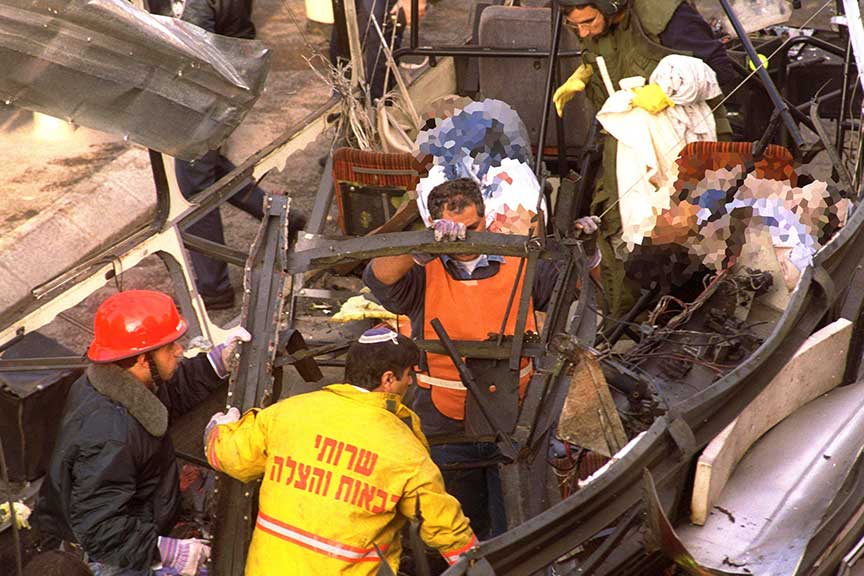A History of Hamas

Bus Bombing in Jerusalem March 1996
The Muslim Brotherhood has been active in the Gaza Strip and other areas of Israel/Palestine since the 1940s. For many years, it focused on social action and religious observance. However, during the first Intifada, which began in December 1987, Hamas (Harakat al-Muqawamah al-Islamiyya) or the Islamic Resistance Movement was established.
Sheikh Ahmed Yassin, a Palestinian cleric, was one of the founders of Hamas. Yassin aimed to create an organization that would not only offer social welfare programs, but also participated in armed resistance against the Israeli occupation. This dual strategy has defined the identity and actions of Hamas since its beginning. On the one hand, Hamas ran hospitals, schools, and other social services; on the other, Hamas has maintained a military wing known as the Izz al-Din al-Qassam Brigades.
Hamas's charter, penned in 1988, advocates for the establishment of an Islamic Palestinian state in place of Israel. Hamas firmly rejects any negotiations or peace agreements with Israel.
Before the Second Intifada, Hamas executed several terrorist attacks, typically in the form of suicide bombings:
• April 16, 1993: Mehola Junction bombing targeting an Israeli bus stop, killing two.
• April 13, 1994: Afula Bus suicide bombing in Afula killed 8.
• October 19, 1994: Dizengoff Street Bus bombing in Tel Aviv killed 22.
• November 11, 1994: Netzarim Junction bicycle bombing killed 3 Israeli soldiers.
• January 22, 1995: Beit Lid Junction bombing targeting Israeli soldiers killed 21.
• April 9, 1995: Kfar Darom Bus bombing killed 7, including children.
• July 24, 1995: Ramat Gan bus 20 bombing in Tel Aviv killed 6.
• August 21, 1995: Ramat Eshkol bus bombing in Jerusalem killed 4.
• February 25, 1996: Ashkelon bus station bombing killed 1.
• February 25, 1996: Jaffa Road bus bombings in Jerusalem killed 26.
• March 3, 1996: Dizengoff Center suicide bombing in Tel Aviv killed 13.
• March 4, 1996: Jerusalem bus 18 bombings killed 19.
• July 30, 1997: Mahane Yehuda Market bombings in Jerusalem killed 16.
• September 4, 1997: Ben Yehuda Street bombings in Jerusalem killed 5.
• October 29, 1998: Gush Katif Junction bombing killed 1 Israeli soldier.
It’s important to note that the bombings which took place in 1996 were instrumental in convincing Israelis that peace with the Palestinians was near impossible and helped elect Benjamin Netanyahu, over Shimon Peres.
During the Second Intifdah Hamas was responsible for some of the most horrendous terror bombings:
• March 4, 2001: A car bomb exploded in Netanya, killing 3 people.
• June 1, 2001: Dolphinarium discotheque bombing in Tel Aviv killed 21 people, most of them teenagers.
• August 9, 2001: Sbarro restaurant suicide bombing in Jerusalem killed 15 people.
• December 2, 2001: Ben Yehuda Street bombings in Jerusalem killed 11 people.
• March 27, 2002: Passover massacre at the Park Hotel in Netanya killed 30 people, prompting Israel's Operation Defensive Shield.
• March 31, 2002: Matza restaurant suicide bombing in Haifa killed 15 people.
• May 7, 2002: Rishon LeZion bombing at a pool hall killed 16 people.
• June 18, 2002: Patt Junction Bus bombing in Jerusalem killed 19 people.
• July 16, 2002: A double suicide bombing in Tel Aviv killed 5 people.
• July 31, 2002: Hebrew University bombing in Jerusalem killed 9 people.
• March 5, 2003: Haifa bus 37 suicide bombing killed 17 people.
• May 18, 2003: A suicide bomber detonated on a Jerusalem bus, killing 7 people.
• June 11, 2003: Jerusalem bus 14A suicide bombing killed 17 people.
• August 19, 2003: Jerusalem bus 2 bombing killed 23 people.
• September 9, 2003: A suicide bombing at the Tzrifin bus stop killed 9 people.
• January 29, 2004: Gaza Street bus bombing in Jerusalem killed 11 people.
• March 14, 2004: Double suicide bombing at the Ashdod Port killed 10 people.
• August 31, 2004: Two buses were targeted in Beersheba, killing 16 people.
• January 13, 2005: Karni crossing attack killed 6 Israeli civilians.
In 2006, Hamas participated in the Palestinian legislative elections and secured a surprising majority. In 2007, Hamas seized power in the Gaza Strip, often by throwing Fatah representatives off tall buildings. Since that time, Gaza has been under Hamas control, while the West Bank remains governed by the Palestinian Authority, which is led by Fatah.
When Hamas took control, representatives of the Quartet (UN, US, Russia, and EU) met with its leadership. They stipulated that in order to receive international aid, Hamas would need to:
• Recognize the State of Israel.
• Renounce violence.
• Accept previously signed agreements between Palestinians and Israelis.
Hamas refused these conditions, leading to its international isolation. Consequently, Israel imposed a blockade on Gaza. This initiated a series of intermittent rocket attacks on Israel, leading to four brief wars.
Significant Hamas attacks include the 2008 clash, where Israel resorted to a ground invasion, following incessant rocket fire from Hamas, and the 2014 assault wherein Hamas employed tunnels to invade Israel prompting another Israeli ground operation in Gaza. Further Hamas escalations were witnessed in 2018, with border fence protests in Gaza and rocket exchanges, and again in May 2021, with an 11-day rocket exchange.
 >
>